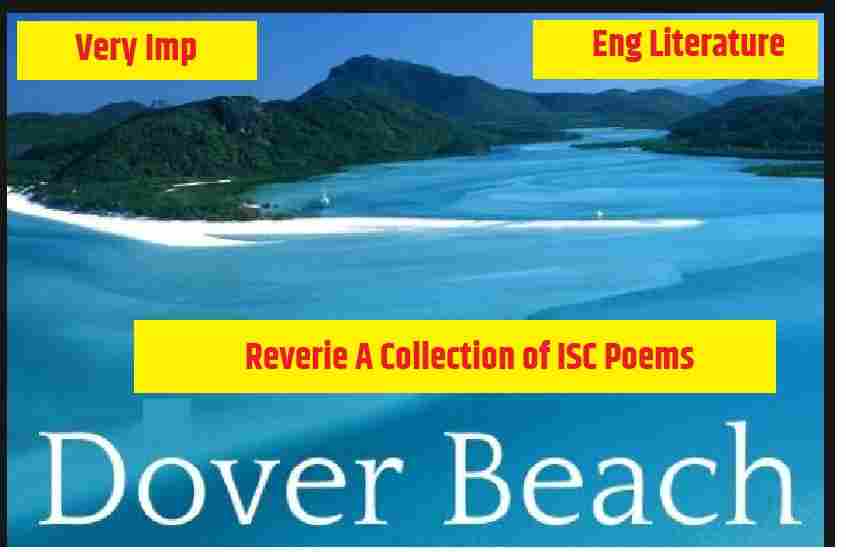Dover Beach : Questions and Answers for ISC Reverie Collection of Poems Workbook Solutions for cracking the next upcoming Sem-2 exam of council. Visit official website CISCE for detail information about ISC Board Class-11 and 12 English.
Dover Beach : Questions and Answers for ISC Reverie Collection of Poems Class 11 and 12

| Board | ISC |
| Class | 12th (XII) |
| Subject | English (Reverie) |
| Chapter | Dover Beach |
| Syllabus | on bifurcated syllabus (after reduction) |
| Session | 2021-22 |
| Bifurcated | Sem-2 |
| Topic | Descriptive / Subjective Question for sec-B |
Dover Beach : Part – 1
Questions and Answers for ISC Reverie Collection of Poems
(a) In ‘Dover Beach’ Matthew Arnold says : “The Sea of Faith/Was once, too, at the full, and round the earth’s shore.” Explain and discuss with reference to the text.
Answer : In ‘Dover Beach’, Matthew Arnold gives expression to people’s declining faith in religion (Christianity). In a beautiful metaphor, he compares faith in religion to the sea of faith. Once this Sea of Faith had encircled the whole world, which means that there was a time when the whole world was full of strong religious belief. But now that faith has declined. As the faith declines, the harsh reality symbolised by ‘naked shingles’ leaves mankind sad and dejected. In other words, it is the lack of faith which is accountable for much suffering and agony in the world.
It is important to keep in mind that the Victorian Age in which this poem was written saw the fast development of science. Charles Darwin’s Theory of the Origin of Species and many other scientific discoveries shook people’s faith in God. The creation of mankind, according to Darwin, was a slow process of evolution. He traces Man’s origin to the ape or the monkey. It runs counter to the religious belief that God made man in His own image. This naturally resulted in doubts and uncertainties in people’s mind. Some lost faith in God and religion, and many others like Arnold wavered in their faith
In another beautiful image in ‘Dover Beach’ Arnold says that people on this earth are no better than two opposing armies fighting each other in total darkness, not knowing whether they are hurting and killing friends and foes. This brings out confusions, doubts and certainties of man in the new world. As a result, the world has turned into a battlefield and people are turning against one another.
In the midst of the crisis of faith, there is only one hope left, according to the poet, and that is , to love and remain loyal to each other.
(b) In what sense is the poem an elegy?
Answer : The main characteristics of an elegy is to lament over the loss of some person or something in us. In Dover Beach, the poet laments the loss of faith. The elegiac note is clearly discernible when the rhythmic sound of the waves make the poet sad. The whole world seems to him devoid of any hope and joy. The world, in fact,
Hath really neither joy, nor love, nor light,
Nor certitude, nor peace, nor help for pain.
Outwardly, the world seems to be bright but in reality it is swallowed by darkness.
The poet is sad to note that people’s faith in religion has declined. This has caused much confusion and doubts in their minds. They have turned against one another. The whole world is now plunged into darkness of ignorance and violence.
This melancholy note turns the poem into a sort of elegy, though it is not an elegy proper. The poet suggests a way to survive in the midst of the soul-killing loss of faith in our world, and that is, to love and remain loyal to each other. When nothing can redeem the situation, even a small step at the individual level in significant and necessary to solve difficult problems.
(c) How does the poet describe the beautiful night scene at Dover in the poem?
Answer : Looking at the beach at Dover at night (through the window of his room) the poet finds the sea calm and the tide full. The moon is shining in the sky. The Strait of Dover is bathed in the moonlight. The moonlight on the distant French coast is dim and then it soon disappears. The cliffs of England, brilliantly shining in the moonlight, extend up to the calm strait.
The presence of the beloved in the room comes to be known as the poet invites his beloved to come and see the beautiful scene. The night air that blows is very pleasant. A long line of water rises up where the sea touches the land bathed in moonlight. The poet draws the attention of the beloved to the harsh sound made by the pebbles as they strike against the shore. As the rising waves recede these pebbles are thrown back on the sandy shore of the sea. The waves rise and fall in a set pattern and produce a slow, trembling kind of music. This slow music brings in the note of everlasting melancholy.
Dover Beach : Part – 2
Questions and Answers for ISC Reverie Collection of Poems
(a) Discuss ‘Dover Beach’ as a dramatic monologue.
Answer : A dramatic monologue is a kind of lyric poem. It is in fact a long speech by a speaker who addresses someone whose presence is felt, though he or she utters no word. The beginning of a poem is generally dramatic and sometimes abrupt. There may be some variation in these features.
‘Dover Beach’ by Matthew Arnold fulfills these conditions to a large measure, and hence many critics regard it as a dramatic monologue. The poem opens on a dramatic note. The line 6 in the first section makes the situation clear –
Come to the window, sweet is the night air!
The speaker, a lover, is standing at the window while his beloved, the silent listener, is in the room. He is drawing her attention to the beautiful scene of the shingled beach at Dover in England. It is a moonlit night. The sea is calm. The moon is shining brightly on the Dover strait while the light on the French coast is becoming dimmer and dimmer.
In line 9, the speaker asks his beloved to listen to the harsh sound of the pebbles as they strike against the shore when the waves advance. When the waves retreat they throw the pebbles on the sandy shore of the sea. The rise and fall of the waves in a set pattern produces a slow, trembling kind of music. This brings in a note of melancholy. The speaker feels sad while recalling the fact that the sea of faith – faith in religion (Christianity) is declining.
The mood of the lover reveals his character in a subtle manner. This is an essential feature of a dramatic monologue. From the speaker’s speech we learn that he is romantic by temperament. He is sensitive to subtle changes in the world of nature. He is melancholic as he reflects on the sad state of affairs in the world in which there is neither hope nor joy. The loss of faith, doubts and uncertainties have made mankind miserable. The condition of the world makes the speaker sad and concerned.
That the speaker has not totally lost hope is clear when he exhorts his beloved.
Ah, love, let us be true
To one another!
This reveals that he is a man of faith. In this wisdom he provides a solution to the general malaise at the individual level. If people continue to love and remain loyal to each other the crisis of faith can be averted.
Thus, ‘Dover Beach’ is in the form of a dramatic monologue. It has almost all the features of this form of poetry.
(b) What is the significance of the allusion to Sophocles in the poem?
Answer : The poet hears the slow sad music of the sea. He is reminded how Sophocles heard the same sad music of the Aegean Sea (the sea between Greece and Asia Minor). Sophocles was a great Greek playwright. The sad music of this sea brought to Sophocles’ mind the wretchedness of human life. This inspired him to write great plays in which he dramatises various aspects of human misery and tragedy. The poet remarks that like Sophocles they (the poet and his beloved) also find a note of human misery in the sound of the sea at Dover Beach. The sound of the sea, thus, gives expression to human misery that was there in Sophocles’ times and is there in their own times.
The allusion to Sophocles is, thus, important as it generalises the whole situation. Human misery is a universal feature. In generalising a particular situation the poet wants to console us that such situations have occurred in the past, too and will continue to recur as well. We need to accept the present state of misery as it is.
(c) How is the metaphor of the sea used in Dover Beach?
Answer : In ‘Dover Beach’ , the sea plays a significant role. It is used both at the literal as well as metaphorical level. The sea provides the setting of the whole poem. The poet describes it vividly. It is calm on a moonlit night. It ebb and flow is heard by the poet clearly.
As the poet advances, it becomes a symbol of eternal human misery. Then it is used as a symbol of faith. Hearing the waves, the poet recalls how once the Sea of Faith encircled the whole earth and sustained all human beings. The Sea of Faith is now fast receding. This faith is the faith in religion and God. In a sad tone the poet says that a world without faith is like a barren sea-coast. In the absence of faith life seems to have lost its purpose and meaning. The world looks beautiful but it is deprived of joy, love, hope, certainty and peace.
Thus, the metaphor of sea helps the poet reflect on the misery of mankind, caused by lack of faith.
Dover Beach : Long Questions
Questions and Answers for ISC Reverie Collection of Poems
Question 1 : ‘Dover Beach’ brings out the loss of faith in the modern world. Discuss with close reference to the text.
Answer : ‘Dover Beach’ by Matthew Arnold bears clearly on the conflict between traditional faith in religion and science. We are made aware of the loss of faith in the modern world, with its ill-effects.
It is important to keep in mind that in the Victorian Age in which this poem was written saw the fast development of science. Charles Darwin’s Theory of the Origin of the Species and many other scientific discoveries shook people’s faith in God. The very basis of religion was eroded. The creations of mankind, according to science, was a slow process of evolution. Man’s origin was traced to the ape or the monkey. It falsified the earlier belief that God made man in His own image. The result was a conflict in people’s mind. Some lost faith in God, others clung to it, and there were many, like Arnold, who wavered in their faith.
In ‘Dover Beach’ , Arnold gives expression to this conflict and the loss of traditional faith. The melancholy note of the sea that the poet hears reminds him of human misery. The unhappiness of man he traces to his loss of religious faith. He recalls in a sad tone:
The Sea of Faith
Was once, too, at the full, and round earth’s shore
Lay like the folds of a bright girdle furled.
But now I only hear
Its melancholy, long, withdrawing, roar,
Once the whole world was full of strong religious belief which is fast declining. As faith declines, the harsh reality symbolised by the ‘naked shingles’ leaves mankind sad and dejected. Without faith the world is hollow and uncertain, devoid of peace and happiness. In a beautiful image the poet brings out confusions, doubts and uncertainties of man in the new world. He says that people on this earth are no better than two opposing armies fighting each other in total darkness, and thus not knowing whether they are hurting and killing friends or their enemies.
Arnold suggests a way to live in the midst of the soul-killing loss of faith in our world, and that is, to love and remain loyal to each other. Perhaps, there is on other way. When nothing can be done at the social level, even a small step at the individual level is significant and necessary to solve difficult problems.
Question 2 : Give a critical analysis of Matthew Arnold’s poem ‘Dover Beach’.
Answer : ‘Dover Beach’ by Matthew Arnold is one of his popular lyrics, and is one of the most representative poems of the Victorian Age. Its main theme is the loss of religious faith and its effect on the minds of the people. The poet notes with concern that the loss of faith has resulted in doubts and uncertainties. People have lost peace of mind. There is no joy, love, light of knowledge or any certainty about anything. Arnold beautifully brings out the confusions, doubts and uncertainties that prevailed in his age:
And we are here as on a darkling plain
Swept with confused alarms of struggle and fight,
Where ignorant armies clash by night.
In this world of uncertainties , no one can do anything. no one can do anything. The only thing which is possible is that as individual human beings we should love one another. This is what Arnold seems to suggest to his beloved, whose presence is felt in the poem:
‘Ah, love, let us be true
To one another………..
A note of melancholy is easily discernible. In fact, the main characters of Arnold’s poetry is melancholy. ‘Dover Beach’ is a short of elegy on the loss of religious faith in the world. The rhythmic sound of the waves strikes the poet as sad. The last stanza which embodies the poet’s vision of the faithless world conveys his deep-felt melancholy. The world, according to him,
Hath really neither joy, nor love, nor light,
Nor certitude, nor peace, nor help for pain
The only consolation in this world, the poet feels, lies in love and devotion.
‘Dover Beach’ is remarkable for its sensuous imagery. The description of the Dover Beach – the calm sea, the full tide, shining moon at night, the twinkling lights on the French coast, the cliffs of England in the bay, the sweet breeze – provides a vivid visual image. The description of the sound of waves as they rise and fall, carrying away pebbles, throwing them up against the beach is quite accurate.
The poem is noteworthy for the use of memorable phrases like “the eternal note of sadness”, “the turbid ebb and flow of human misery”, and the like. The lines are so arranged as to provide an impression of the movement of sea waves. The use of alliteration is skilful and adds to the music of the poem.
On the whole, ‘Dover Beach’ is Arnold’s superb lyric . It is still relevant because of its lyrical facility, brilliant imagery and the note of melancholy.
Question 3 : In what way does the poem ‘Dover Beach’ move from description to reflection. Discuss with close references to the text.
Answer : ‘Dover Beach’ by Matthew Arnold is a brilliant poem. It is beautifully structured to convey the idea of the loss of religious faith in the Victorian era. ‘The Sea of Faith’ is the central metaphor which binds the whole poem. The poem opens on a vivid description of the sea at Dover Beach. This part of the poem is descriptive. The sound of sea waves reminding the poet of Sophocles and the eternal misery of mankind forms the second part, which clearly shows a movement rom description to reflection. The third and the last part is a pure reflection on the state of the present-day world reeling under the ill-effects of the loss of faith.
The poem opens with the description of moonlit scene at Dover Beach. The sea is calm and the tide is full. The moon shines brightly on the Dover Strait, while the light on the French coast becomes dimmer and dimmer and then disappears totally. On the English side the rocky cliffs stand firm, bathed in the moonlight. A long line of water drops rises up where the sea touches the land. The beloved who is present on the scene is asked to listen to the harsh sound of pebbles as they strike against the shore with the retreat of the waves. The rise and fall of waves produces a slow, trembling kind of music which fills the poet’s mind with sadness.
This melancholy note of the sea reminds the poet of a similar sad note that Sophocles, a Greek dramatist, must have heard on the shore of the Aegean Sea. He must have found in the sad music of the sea the meaning of human misery and expressed it in his tragic plays. Here the sea acquires symbolic value, it being the symbol of eternal note of sadness.
In the last part, the poet becomes totally reflective. The sea is now used as a symbol of faith. Once the Sea of Faith encircled the whole earth and sustained mankind. But now the Sea of Faith is retreating, leaving behind the harsh reality in the form of naked shingles on the sandy beach. The sea, thus, comes to stand for traditional religious belief. In other words, faith in religion is declining due to advances in science, while reality is becoming harsh to face. There is no love, no joy, no light of knowledge and no certainty. The ignorant people seem to be fighting with one another in the darkness of ignorance, without knowing who is the enemy and who is the foe. In this world of total confusion and chaos, the only hope lies in mutual love and understanding . That is why the poet urges his beloved that both should be loyal to each other:
‘Ah, love, let us be true
To one another……..’
Thus, the tree parts of the poem are provided a structural unity by the use of the symbol of the sea which acquires different meanings as the poem advances from description to reflection.
– : End of Dover Beach : Questions and Answers for ISC Reverie :-
-: also visit :-
- ISC Sem-2 Question Bank Class-12
- Sem-2 ISC Specimen Paper for Class-12
- ISC Class-12 Textbook Solutions ,Syllabus, Solved Paper
- Previous Year Question Paper for ISC Class-12
Please share with your ISC friends if it is helpful
Thanks


